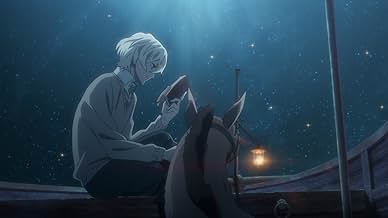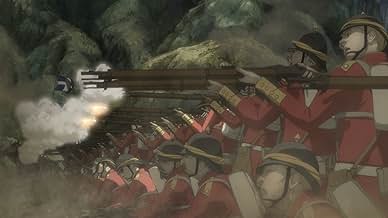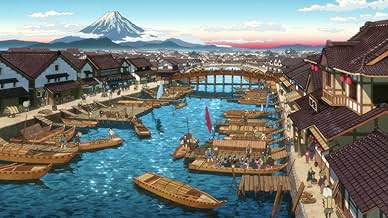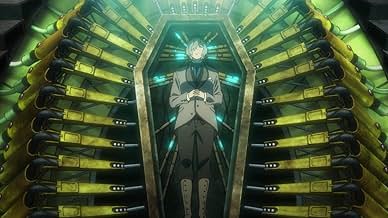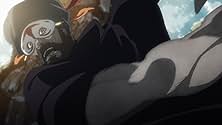NOTE IMDb
6,0/10
1,5 k
MA NOTE
Ajouter une intrigue dans votre langueAfter breaking the law of reanimating human corpses, young Watson has to either work for the government or face punishment. He has to go on a secret mission, to find the notes of Viktor Fran... Tout lireAfter breaking the law of reanimating human corpses, young Watson has to either work for the government or face punishment. He has to go on a secret mission, to find the notes of Viktor Frankenstein, who reanimated the first human corpse.After breaking the law of reanimating human corpses, young Watson has to either work for the government or face punishment. He has to go on a secret mission, to find the notes of Viktor Frankenstein, who reanimated the first human corpse.
- Récompenses
- 2 nominations au total
Clint Bickham
- Additional Voices
- (English version)
- (voix)
Pietro Biondi
- L'Uno
- (voix)
Anthony Bowling
- Additional Voices
- (English version)
- (voix)
Duncan Brannan
- Additional Voices
- (English version)
- (voix)
Justin Briner
- Additional Voices
- (English version)
- (voix)
Ben Bryant
- Additional Voices
- (English version)
- (voix)
Chris Burnett
- Additional Voices
- (English version)
- (voix)
Bradley Campbell
- Additional Voices
- (English version)
- (voix)
Clifford Chapin
- Additional Voices
- (English version)
- (voix)
Greg Dulcie
- Grant
- (English version)
- (voix)
R. Bruce Elliott
- 1
- (English version)
- (voix)
Ricco Fajardo
- Additional Voices
- (English version)
- (voix)
Issei Futamata
- Narrator
- (voix)
Histoire
Le saviez-vous
Commentaire à la une
I'm not familiar with the source material, so I can't speak to this film as an adaptation, but that does allow me to assess it more on its own merits. Just as much to the point, I can watch it with fresh eyes and appreciate this iteration of the story all on its own. And to that end, I was immediately swept away. It's fair and accurate to describe this as a sci-fi horror adventure-thriller, for the tale very much falls under all these categories while occasionally bearing wisps of humor to taste. It's perhaps more helpful to observe that 'The empire of corpses' leaps past "macabre," as one would suppose of gothic horror drawn from Mary Shelley's 'Frankenstein,' and becomes downright grotesque in its exploration of a world in which corpses are reanimated as soldiers, servants, labor, and veritable walking weapons. More than that, I readily find this to be fascinating, intoxicating, and brilliant in everything that it weaves together, the concept that it builds out, and the complex characters and ideas that it examines. I sat to watch with no foreknowledge or expectations, and I'm blown away by a movie that's far better than I could have ever dreamt. How is this not more widely visible and recognized?
The setting moves from Victorian London, to Afghanistan during military involvement between the British and Russian Empires, to Japan in the years following the Meiji Restoration. Characters include fictionalized versions of historical figures, and others borrowed from classic literature. Elements borrowed or alluded to include everything from Shelley, to Sir Arthur Conan Doyle, to Ian Fleming, and more. A saga founded on the macabre and the grotesque, thereby being genuinely horrifying and unsettling, is also earnestly thrilling as international intrigue dances across all such proper nouns and discernible notions, further stirring in daring exploits and violent action. It's also stirring and thought-provoking in touching upon philosophical consideration of science, humanity, and "the soul" by way of our protagonist John Watson (yes, that John Watson), a particularly ambitious and driven "corpse engineer" who seeks to advance the discipline of "necroware" and come closer to duplicating Victor Frankenstein's achievement of a thinking, feeling reanimated corpse with a soul. Of all the genre fare that has ever revisited Shelley's quintessential masterpiece one wouldn't assume more far-flung, fantastical varieties to be the ones that come closest to latching onto the same earnest, meaningful ruminations, and beyond yet like Honda Ishiro's kaiju piece 'Frankenstein vs. Baragon,' this surprises again and again by doing just that.
Again and again I was stunned while watching 'The empire of corpses,' and in many different ways. I don't know Project Itoh, but I want to after seeing this, because the adaptation penned by Goto Midori, Seko Hiroshi, and Yamamoto Koji is truly outstanding. Gripping, haunting, disturbing, dazzling, invigorating, stimulating, and deeply entrancing, these two hours run the gamut with more ingenuity, imagination, and heart than many straight dramas can claim. Characters are flush with palpable vitality, intelligence, and personality; the dialogue is just as smart, captivating, and important as the exquisite, dynamic scene writing in tying all the many disparate parts together into a momentously cohesive, staggeringly compelling, shrewd, rich narrative. And still, even as we could spend hours dissecting all the inclusions and references, the genre spaces at hand, and the themes and bigger ideas, further including will and consciousness, every last odd and end is judiciously applied, and fruitfully exercised. It would have been easy for this flick to have been merely a joyride (2003 blockbuster 'The League of Extraordinary Gentlemen' comes to mind) - and it is that, in part - but through utterly brilliant writing, and through the equally brilliant direction of Makihara Ryoutarou that so faithfully brings it all to bear, the picture manages to be wholly bewitching, unexpectedly dark, and downright intellectual in ways well beyond what I'd ever assumed.
But we're just getting started. The original music of Ike Yoshihiro is just as striking, and just as marvelously dynamic as the writing. Themes vary by tone, mood, and locale, and by the genre space being spotlighted in a given moment. From softly searing and disquieting, to sweeping, dramatic and epic, and from gentle, pensive, and emotional to upbeat and action-oriented - and everything in between - Ike's score takes us on just as much of a journey as the story it complements. I was taken again and again throughout the length by the music in a way that isn't always true in a medium where composers are nevertheless routinely integral to the lasting success of a feature. Why, as the end credits begin to roll, we're greeted with the Egoist song "Door" which is just as flawless in serving as a capstone: somber but expansive in its chords and instrumentation, with Chelly's luscious voice enticing us, I can't help but think of the songs regularly placed foremost in Eon Productions' James Bond franchise. I believe that's rather intentional, given the references in the plot, but whether we want to directly compare to Garbage's "The world is not enough" or Adele's "Skyfall," or just admire "Door" all on its lonesome, the tune is just as superb as all else herein. And that, truthfully, is saying a great deal.
Then there's the animation. We expect much of modern animation, and moreover, as I've recently dipped my toes into anime, I'm firmly of the mind that studios in Japan have long boasted a mastery of the medium that their counterparts elsewhere can only aspire to - in terms of both the visual experience, and the storytelling. And this applies just as readily here. Everything we anticipate of anime is here in spades: terrific designs for characters and all active elements, and for that matter keen emotional expression; stupendously gorgeous, often creative backgrounds and environments, be they interior or exterior, landscape or cityscape; fluid, exciting action, and sensational effects; fine consideration for lighting, shading, perspective, and more. All this, with splendid detail and texture across the board, and in 2D no less. Where 3D is sparingly employed as embellishment, augmentation, and flair, it is with a sagacity on par with the best I've seen in other kindred works, and I am once again so pleased that the 2D style remains so predominantly favored in Japanese animation. It's at times like these that I bemoan the rush by major industry players like Disney, Pixar, or DreamWorks to adopt 3D digital rendering, because as we've seen time and again, in my opinion there is richness in 2D that isn't possible in the same way in 3D.
The voice cast give reliably fantastic, vibrant performances of range and nuance to bring their characters to life. The audio is robust and vivid, allowing every note, word, and sound to ring out clearly; the fundamental image quality is pristine. Even Hida Aya's editing is notably sharp. Is there any criticism to be had with this title? Personally, I don't think there is. In fact, between the overall excellence and the especial strength of the storytelling, frankly I'm of the mind that this is one of the best animated films I've ever seen. I sat to watch more or less presuming a good time, and I was subsequently ensorcelled for two straight hours. There is so much that 'The empire of corpses' blends together, and it does so tremendously well to the point that I would consider this a grand accomplishment, and an immense credit to all involved. I grant that it won't appeal equally to all comers, but for all the easy paths that a concept like this could have taken, the production is wonderfully complicated and looming in its scope, and I can only admire all the skill and care that went into it. As far as I'm concerned this is pretty much just a must-see, and whether you're specifically enamored with the genres at hand, or the premise, or just looking for a good time, I'm happy to give 'The empire of corpses' my very high, hearty, and enthusiastic recommendation!
The setting moves from Victorian London, to Afghanistan during military involvement between the British and Russian Empires, to Japan in the years following the Meiji Restoration. Characters include fictionalized versions of historical figures, and others borrowed from classic literature. Elements borrowed or alluded to include everything from Shelley, to Sir Arthur Conan Doyle, to Ian Fleming, and more. A saga founded on the macabre and the grotesque, thereby being genuinely horrifying and unsettling, is also earnestly thrilling as international intrigue dances across all such proper nouns and discernible notions, further stirring in daring exploits and violent action. It's also stirring and thought-provoking in touching upon philosophical consideration of science, humanity, and "the soul" by way of our protagonist John Watson (yes, that John Watson), a particularly ambitious and driven "corpse engineer" who seeks to advance the discipline of "necroware" and come closer to duplicating Victor Frankenstein's achievement of a thinking, feeling reanimated corpse with a soul. Of all the genre fare that has ever revisited Shelley's quintessential masterpiece one wouldn't assume more far-flung, fantastical varieties to be the ones that come closest to latching onto the same earnest, meaningful ruminations, and beyond yet like Honda Ishiro's kaiju piece 'Frankenstein vs. Baragon,' this surprises again and again by doing just that.
Again and again I was stunned while watching 'The empire of corpses,' and in many different ways. I don't know Project Itoh, but I want to after seeing this, because the adaptation penned by Goto Midori, Seko Hiroshi, and Yamamoto Koji is truly outstanding. Gripping, haunting, disturbing, dazzling, invigorating, stimulating, and deeply entrancing, these two hours run the gamut with more ingenuity, imagination, and heart than many straight dramas can claim. Characters are flush with palpable vitality, intelligence, and personality; the dialogue is just as smart, captivating, and important as the exquisite, dynamic scene writing in tying all the many disparate parts together into a momentously cohesive, staggeringly compelling, shrewd, rich narrative. And still, even as we could spend hours dissecting all the inclusions and references, the genre spaces at hand, and the themes and bigger ideas, further including will and consciousness, every last odd and end is judiciously applied, and fruitfully exercised. It would have been easy for this flick to have been merely a joyride (2003 blockbuster 'The League of Extraordinary Gentlemen' comes to mind) - and it is that, in part - but through utterly brilliant writing, and through the equally brilliant direction of Makihara Ryoutarou that so faithfully brings it all to bear, the picture manages to be wholly bewitching, unexpectedly dark, and downright intellectual in ways well beyond what I'd ever assumed.
But we're just getting started. The original music of Ike Yoshihiro is just as striking, and just as marvelously dynamic as the writing. Themes vary by tone, mood, and locale, and by the genre space being spotlighted in a given moment. From softly searing and disquieting, to sweeping, dramatic and epic, and from gentle, pensive, and emotional to upbeat and action-oriented - and everything in between - Ike's score takes us on just as much of a journey as the story it complements. I was taken again and again throughout the length by the music in a way that isn't always true in a medium where composers are nevertheless routinely integral to the lasting success of a feature. Why, as the end credits begin to roll, we're greeted with the Egoist song "Door" which is just as flawless in serving as a capstone: somber but expansive in its chords and instrumentation, with Chelly's luscious voice enticing us, I can't help but think of the songs regularly placed foremost in Eon Productions' James Bond franchise. I believe that's rather intentional, given the references in the plot, but whether we want to directly compare to Garbage's "The world is not enough" or Adele's "Skyfall," or just admire "Door" all on its lonesome, the tune is just as superb as all else herein. And that, truthfully, is saying a great deal.
Then there's the animation. We expect much of modern animation, and moreover, as I've recently dipped my toes into anime, I'm firmly of the mind that studios in Japan have long boasted a mastery of the medium that their counterparts elsewhere can only aspire to - in terms of both the visual experience, and the storytelling. And this applies just as readily here. Everything we anticipate of anime is here in spades: terrific designs for characters and all active elements, and for that matter keen emotional expression; stupendously gorgeous, often creative backgrounds and environments, be they interior or exterior, landscape or cityscape; fluid, exciting action, and sensational effects; fine consideration for lighting, shading, perspective, and more. All this, with splendid detail and texture across the board, and in 2D no less. Where 3D is sparingly employed as embellishment, augmentation, and flair, it is with a sagacity on par with the best I've seen in other kindred works, and I am once again so pleased that the 2D style remains so predominantly favored in Japanese animation. It's at times like these that I bemoan the rush by major industry players like Disney, Pixar, or DreamWorks to adopt 3D digital rendering, because as we've seen time and again, in my opinion there is richness in 2D that isn't possible in the same way in 3D.
The voice cast give reliably fantastic, vibrant performances of range and nuance to bring their characters to life. The audio is robust and vivid, allowing every note, word, and sound to ring out clearly; the fundamental image quality is pristine. Even Hida Aya's editing is notably sharp. Is there any criticism to be had with this title? Personally, I don't think there is. In fact, between the overall excellence and the especial strength of the storytelling, frankly I'm of the mind that this is one of the best animated films I've ever seen. I sat to watch more or less presuming a good time, and I was subsequently ensorcelled for two straight hours. There is so much that 'The empire of corpses' blends together, and it does so tremendously well to the point that I would consider this a grand accomplishment, and an immense credit to all involved. I grant that it won't appeal equally to all comers, but for all the easy paths that a concept like this could have taken, the production is wonderfully complicated and looming in its scope, and I can only admire all the skill and care that went into it. As far as I'm concerned this is pretty much just a must-see, and whether you're specifically enamored with the genres at hand, or the premise, or just looking for a good time, I'm happy to give 'The empire of corpses' my very high, hearty, and enthusiastic recommendation!
- I_Ailurophile
- 11 oct. 2024
- Permalien
Meilleurs choix
Connectez-vous pour évaluer et suivre la liste de favoris afin de recevoir des recommandations personnalisées
- How long is The Empire of Corpses?Alimenté par Alexa
Détails
Box-office
- Montant brut mondial
- 43 320 $US
- Durée2 heures
- Couleur
- Rapport de forme
- 1.78 : 1
Contribuer à cette page
Suggérer une modification ou ajouter du contenu manquant

Lacune principale
By what name was The Empire of Corpses (2015) officially released in Canada in English?
Répondre


